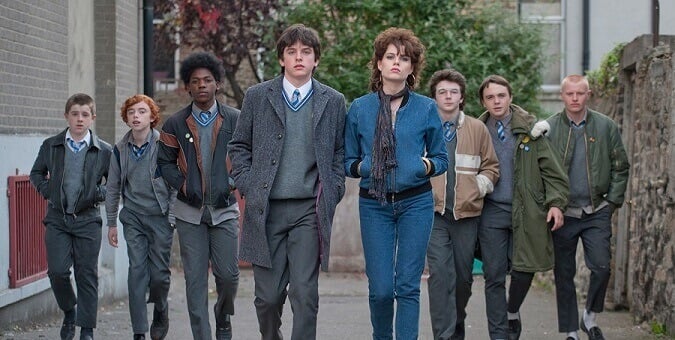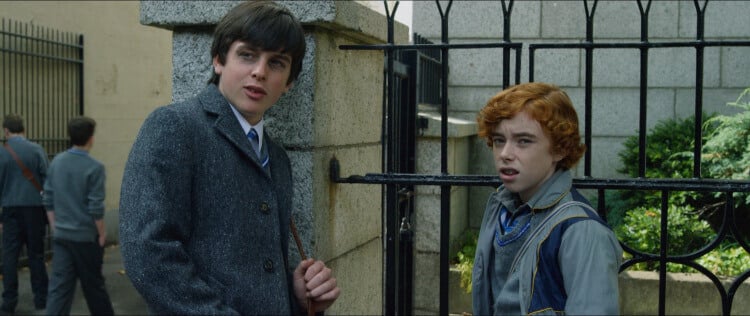80s nostalgia is an odd thing. Much of the time these days, properties based around celebrating the 80s aren’t interested in the actual decade, so much as an exaggerated version of it with only mild ties to reality. The 80s celebrated in movies like Kung Fury, or similar throwbacks, feel like they’re imitating something that never really existed, a rose-colored fever dream of neon, mullets and rolled-up jacket sleeves. So when a movie comes along with a more restrained — or even realistic — look at the 1980s and the culture that shaped the decade, it can feel like a refreshing does of sanity. This is what Sing Street offers: a more subtle and down-to-earth depiction of a turbulent decade for music, fashion, self-expression, and art at large. It’s about being on the ground floor when old ideas were on their way out, and bright, shiny new ones were coming in. Plus, there’s catchy and well-performed 80s-style jams!
Sounds pretty great, right? Well, there’s a problem. While Sing Street‘s perspective and focus on normal people living in strange times makes for a compelling viewpoint, it’s also marred by another perspective, one of inadvertent narcissism. Sing Street feels like a film made from the perspective of someone who isn’t fully aware of their own self-centered nature, someone who perhaps doesn’t realize how they see other people. It’s a film where people largely come in two types: the protagonist, and everyone else. If a character is in the second category, they exist solely to facilitate the hero’s story arc and needs. Almost nobody outside the main character feels like an actual human being in the midst of their own story, and as a result the whole film takes on an air of narcissism and self-fulfillment instead of the camaraderie and community that other band moves have been built on.

Our hero and focus is Conor, a highschool boy living in Dublin. After being moved to a rough-and-tumble public school, Conor’s eye is caught by Raphina, a girl frequently seen hanging out by the schoolyard. To impress her, Conor starts a band and begins filming music videos focused on Raphina, finding new success and confidence by embracing the fashions and styles of the time. Meanwhile, his home life continues to deteriorate as his parents’ marriage grows more tenuous.
Sing Street is not an ensemble film, despite its expansive cast. While predecessors like The Commitments felt at once anchored by a lead character and still free to explore its supporting cast, Sing Street treats is supporting cast as a means to an end and little more. We meet a character, like the various member of the band, and maybe they get in a line or two before fading into the background. When they are around, it’s to serve exactly one purpose: make sure Conor’s narrative is on track. They have no role or presence outside what they contribute to his narrative, and as such feel like they’re only ever given screen time on sufferance. No one outside of Conor and a handful of others, therefore, feel real. It seems like a world set in a videogame, where 95% of the faces you see are just automatons, trundling around and checking boxes on the player’s to-do-list. Giving the rest of the actors some character wouldn’t be hard; an extra line of dialogue here, a conflicting objective there or word of dissent there would be enough, but they aren’t a supporting cast so much as props.
And for the few cast members actually allowed to have a presence and a distinct personality, things aren’t much better. Take for instance Raphina, Conor’s love interest and muse, who is written from the big book of cliches for love interests. She’s beautiful, and the main character begins his pursuit of her before he even exchanges one word with her. She has a boyfriend we’re supposed to hate, because otherwise intelligent women are always dating scumbags in these movies until the Nice Guy hero comes along to treat her right and therefore win her love. She has no real personality traits outside of her beauty and vulnerability, masked by a too-cool-for-school nonchalance. At the very least she’s given a long-term goal, one that Conor is thankfully interested in facilitating.

But even when something happens or is revealed, a moment that could potentially deepen her narrative, the film is more interested in Conor’s reaction to it than what it means for her. In one key scene, Raphina heavily implies that she’s been the victim of some horrible things, and in fact doesn’t even realize her victimhood. She’s been wronged, and just as shockingly has been normalized to it. Conor sputters and stammers, and Raphina blithely moves on. The next scene — the very next scene — Conor is simply staring at her from across the bus,as she herself stares out the window, ringed in an angelic light. What matters is not what we’ve learned, what it means for Raphina’s character, but rather that Conor is even more infatuated with her now. For reasons one can only guess at, this revelation has somehow made her more desirable.
To say this is bad writing of your female lead is an understatement. For one, a woman’s trauma is used not as a component of her story, but instead for her male counterpart to react to. This trauma, by the way, is never brought up or mentioned again. What matters is Conor’s reaction. Once that’s out of the way, her trauma becomes irrelevant. It also reinforces Raphina’s status as something to be pursued, gawked at, worshipped…but never, ever engaged with. What matters is what she brings to Conor’s story: a muse, a romantic partner, a pretty face for his videos. There’s never a sense that they’ve connected as people.
This pattern repeats across the whole film. Conor’s parents constantly scream at each other, while Conor plunders their arguments for song lyrics. He makes friends at school, but rather than people he confides in and has meaningful interactions with, they become a means to an end. His friend Darren becomes simply “the guy who holds the camera,” and Eamon turns into “his songwriting partner.” We never get a sense of the mechanics of any of these relationships, because they aren’t relationships — they’re transactions.
There’s one line in particular that seems to embody this tendency. At one point, Conor says “When you don’t know someone, they’re more interesting. They can be anything you want them to be.” Read that again: “Anything you want them to be.” So, what you’re saying, Conor, is that people are more interesting when, through distance, you can imagine that they’re ideally suited to meet your needs and desires? Because that’s why people exist, why they’re interesting? To be what you want? That line may sound romantic, the musings of a poet and dreamer, but it reveals that Conor, and by extension the writer (given how blissfully un-self-aware the writing is), only sees other people as means to an end. He doesn’t engage with the people around with him, even his ostensible love interest, because he openly admits to preferring the idealized versions he has in his head. He doesn’t love Raphina — he loves the possibility of Raphina, his ideal of her. His attraction to her is emphasized the most strongly when he’s just looking at her from afar.

The one, wholly welcome exception to this is Conor’s older brother, Brendan. For most of the film, Brendan is similarly defined by what Conor can gain from him. Brendan will tell him about what’s cool and interesting in music, which Conor then parrots later to sound smart for Raphina. But in one scene, perhaps the best of the entire film, Brendan suddenly displays more characterization than anyone outside of Conor has before. Suddenly, someone other than our supposed hero has a perspective, an inner conflict, something of their own. But this also quietly goes away, leaving the audience perhaps wishing that this had been as much Brendan’s movie as Conor’s.
There’s stuff to like in Sing Street. The songs, from writer/director John Carny, are catchy. The perspective of normal life in the midst of the turbulent 80s is rife with possibility. Unfortunately it feels distinctly like the work of a user, someone who treats the people around him either as things to be viewed and attained, or stepping stones. The main character of any story, of course, is the center of that universe. But in the case of Sing Street, it feels like there is no universe outside of Conor. It feels like a work of solipsism, of a self-centered worldview that ignores the humanity of the people around you.
But at least it’s got a beat you can dance to.































